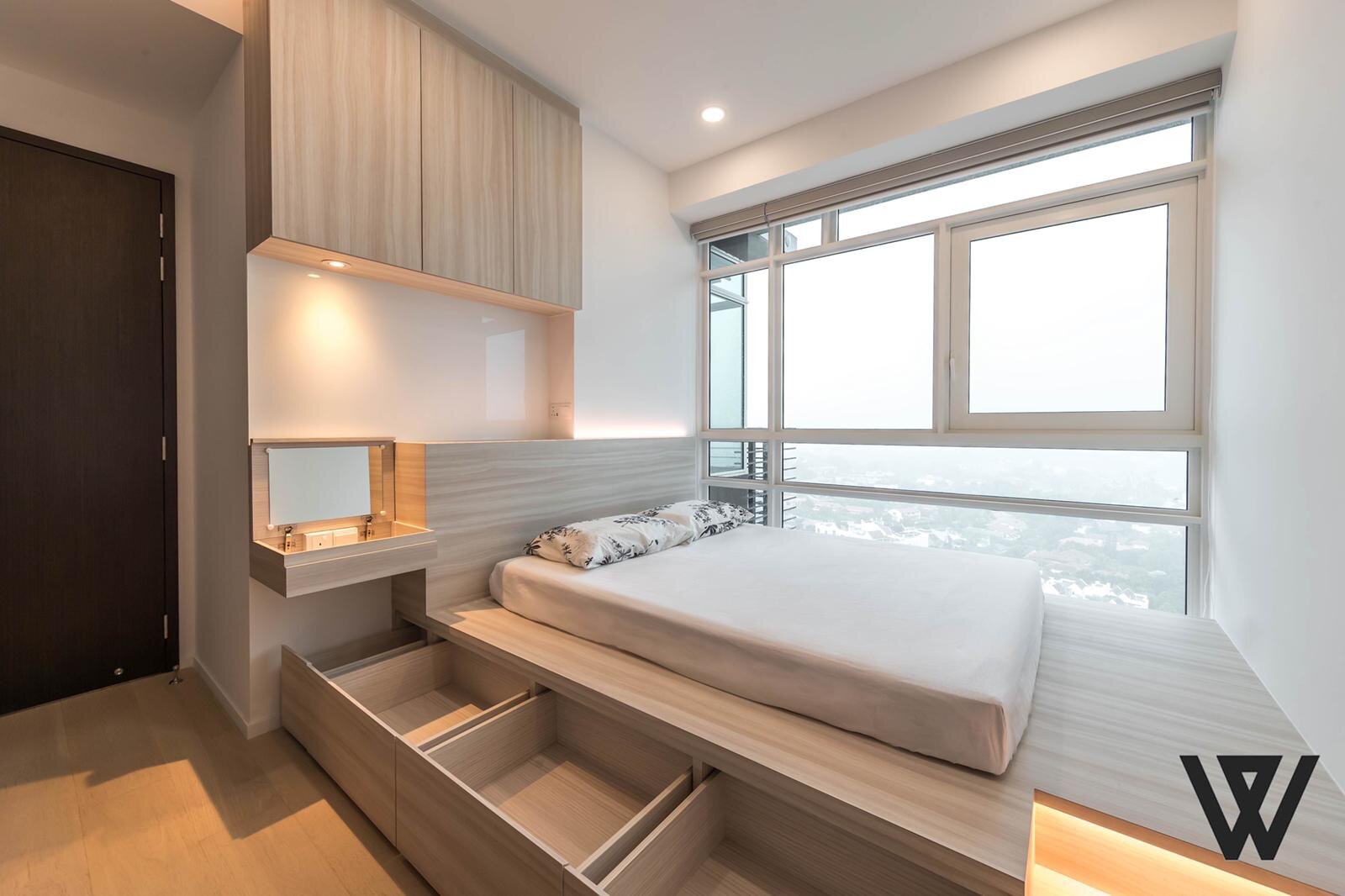Financial Considerations

When evaluating a 1-bedroom versus a 2-bedroom condo investment, financial factors play a crucial role in determining the overall profitability and suitability of each option. Understanding the purchase price, potential rental income, expenses, and appreciation rates can help investors make informed decisions.
Purchase Price Comparison
The purchase price is the initial investment required to acquire a condo. In general, 2-bedroom condos tend to be more expensive than 1-bedroom condos due to their larger size and potential for accommodating more occupants. The specific price difference can vary depending on the location, amenities, and overall market conditions. For instance, in a popular urban area like San Francisco, a 1-bedroom condo might cost around $800,000, while a 2-bedroom condo could be priced at $1.2 million.
Rental Income Potential, 1 bedroom vs 2 bedroom condo investment
Rental income is a key factor in determining the return on investment. 2-bedroom condos typically command higher rental rates than 1-bedroom condos, as they cater to a broader market, including families or roommates. The potential rental income can vary based on location, market demand, and the condition of the unit. For example, in a thriving city like New York, a 1-bedroom condo could generate monthly rental income of $3,000, while a 2-bedroom condo might fetch $4,500.
Monthly Expenses
Owning a condo involves various recurring expenses, including mortgage payments, property taxes, homeowners’ association (HOA) fees, and utilities. 2-bedroom condos generally have higher monthly expenses than 1-bedroom condos due to their larger size and potential for increased utility consumption.
Here’s a breakdown of typical monthly expenses for a 1-bedroom versus a 2-bedroom condo:
| Expense | 1-Bedroom Condo | 2-Bedroom Condo |
|---|---|---|
| Mortgage Payment | $2,000 | $3,000 |
| Property Taxes | $300 | $450 |
| HOA Fees | $250 | $350 |
| Utilities (Electricity, Water, Gas) | $200 | $300 |
| Total Monthly Expenses | $2,750 | $4,100 |
Appreciation Rates
Appreciation refers to the increase in the value of an asset over time. In general, both 1-bedroom and 2-bedroom condos can appreciate in value, but the rate of appreciation can vary depending on factors such as location, market demand, and economic conditions.
Appreciation rates are often influenced by the overall real estate market in the area.
For instance, in a rapidly growing city like Austin, Texas, both 1-bedroom and 2-bedroom condos might experience an average annual appreciation rate of 5-7%. However, in a more stable market, such as Chicago, the appreciation rate could be lower, around 3-4%.
Lifestyle and Needs: 1 Bedroom Vs 2 Bedroom Condo Investment
The decision between a 1-bedroom and a 2-bedroom condo goes beyond financial considerations. It’s a choice that deeply impacts your lifestyle and personal needs. Understanding the advantages and disadvantages of each option for different demographics can help you make an informed decision.
Lifestyle Considerations for Different Demographics
The choice between a 1-bedroom and a 2-bedroom condo is often dictated by your lifestyle and personal needs. Here’s a breakdown of how these factors influence your decision:
- Single Individuals: A 1-bedroom condo is often the ideal choice for single individuals. It offers a compact and affordable living space, minimizing expenses and maximizing flexibility. The space is sufficient for personal needs and can be easily maintained. However, a 2-bedroom condo might offer more space for hobbies, a home office, or guest visits.
- Couples: Couples often find a 1-bedroom condo suitable for their needs, especially if they prefer a more intimate and cozy living environment. However, a 2-bedroom condo provides more space for personal belongings, a home office, or a guest room. This is particularly beneficial for couples who enjoy hosting friends and family or who work from home.
- Families: Families with children typically require the additional space and functionality of a 2-bedroom condo. It offers separate bedrooms for children, a larger living area for family gatherings, and potentially a dedicated play area. A 1-bedroom condo can be challenging for families, especially as children grow older and need their own space.
Amenities and Features
The amenities and features offered in 1-bedroom and 2-bedroom condos can vary significantly. Here’s a general comparison:
- 1-Bedroom Condos: Typically offer basic amenities like a kitchen, bathroom, and living area. Some might include additional features like a balcony or in-suite laundry. They are often found in smaller buildings with fewer amenities.
- 2-Bedroom Condos: Usually come with more amenities and features, such as larger kitchens, in-suite laundry, and balconies. They are more likely to be found in larger buildings with a wider range of amenities, including swimming pools, fitness centers, and community spaces.
Pros and Cons of Smaller vs. Larger Condo Spaces
The size of your condo directly impacts your living experience. Here’s a breakdown of the advantages and disadvantages of smaller and larger spaces:
Smaller Condo Space
- Pros:
- Lower Costs: Smaller condos generally have lower purchase prices and maintenance fees, making them more affordable.
- Less Cleaning and Maintenance: Smaller spaces require less time and effort for cleaning and maintenance, freeing up your time for other activities.
- Energy Efficiency: Smaller spaces often require less energy to heat and cool, resulting in lower utility bills.
- Cons:
- Limited Space: Smaller spaces can feel cramped, especially if you have a lot of belongings or a large family.
- Less Storage: Smaller condos typically have less storage space, which can be challenging for organizing belongings.
- Limited Flexibility: Smaller spaces offer less flexibility for rearranging furniture or adding new items.
Larger Condo Space
- Pros:
- More Space: Larger spaces offer more room to move around, entertain guests, and create dedicated spaces for hobbies or work.
- Greater Flexibility: Larger spaces provide more flexibility for rearranging furniture and adding new items.
- More Storage: Larger condos typically have more storage space, making it easier to organize belongings.
- Cons:
- Higher Costs: Larger condos generally have higher purchase prices and maintenance fees.
- More Cleaning and Maintenance: Larger spaces require more time and effort for cleaning and maintenance.
- Potential for Unused Space: If you don’t utilize the extra space effectively, it can feel empty and wasteful.
Resale Value
- 1-Bedroom Condos: Generally have a lower resale value compared to 2-bedroom condos in the same location, due to their smaller size and appeal to a narrower range of buyers.
- 2-Bedroom Condos: Typically command higher resale values due to their larger size and appeal to a wider range of buyers, including families and couples seeking more space.
Market Demand

Understanding the market demand for 1-bedroom and 2-bedroom condos is crucial for making an informed investment decision. This involves analyzing the current demand, identifying the typical buyers or renters, and understanding the factors that influence the market.
Demand Analysis
The demand for 1-bedroom and 2-bedroom condos varies depending on the location and local market conditions. Factors like population growth, job market, and local economy play a significant role in determining the demand.
For instance, in areas with a growing population and a strong job market, the demand for both 1-bedroom and 2-bedroom condos tends to be higher. This is because more people are moving into the area, increasing the need for housing. Conversely, in areas with a declining population or a weak economy, the demand for condos may be lower.
Typical Buyers and Renters
- 1-bedroom condos: These are often popular among young professionals, singles, and couples without children. They are also attractive to retirees or individuals looking for low-maintenance living.
- 2-bedroom condos: These are typically preferred by families with young children, couples looking for more space, or roommates sharing an apartment.
Factors Influencing the Market
- Local Economy: A strong local economy with job growth and low unemployment rates typically leads to higher demand for housing, including condos. Conversely, a weak economy can lead to lower demand and potentially lower rental rates or resale values.
- Population Growth: Areas with a growing population generally have higher demand for housing, as more people are looking for places to live. This can drive up prices and make it more attractive to invest in condos.
- Job Market: A strong job market with high-paying jobs can attract more people to an area, increasing the demand for housing. This can also lead to higher rental rates and resale values for condos.
Vacancy Rates
Vacancy rates are an indicator of the demand for rental properties. A low vacancy rate indicates high demand, while a high vacancy rate suggests lower demand.
Vacancy rates for 1-bedroom and 2-bedroom condos can vary significantly depending on the location and the overall market conditions.
For example, in a highly desirable location with limited inventory, vacancy rates for both 1-bedroom and 2-bedroom condos may be lower. Conversely, in areas with a surplus of available units, vacancy rates may be higher.
